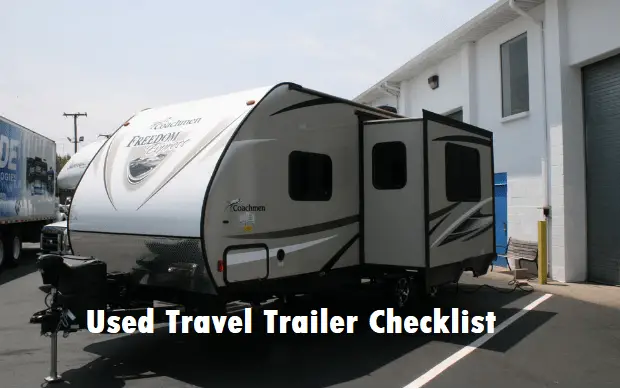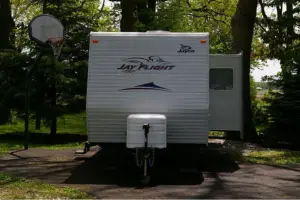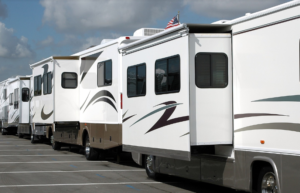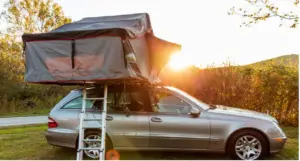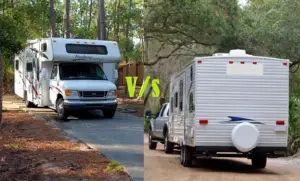A used travel trailer can be a good deal looking at the depreciation that we see in rv’s. But, one of the important points when buying a used trailer is “avoiding a lemon”. A good way to save on initial cost can turn out to be complete waste of money or a lot of expenditure on repairs and replacements.
A good pre buying inspection can help in avoiding a lemon. Here is a checklist that you should go through before buying a travel trailer or any other rv as well (most points are used travel trailer specific but also apply to any other used rv like fifth wheel, class A motrohome, class c motorhome or pop up camper trailer as well)
1. Check water systems thoroughly
Water is an integral part of rving. Any rv would basically have water systems that would support for living in them. A fresh water tank for storing daily usage drinking water, showers and kitchen. Grey and black water tanks for dirty water storage. Pipes connecting between the tanks to the taps, all of these things constitute the water system in rv.
Make sure you check the whole system thoroughly, as even a single fault in the overall piping system could be a costly repair and a prolonged annoyance for you, if you fail to identify any of the faults.
Water systems are critical and you need to protect them from excessive pressure and thus, its necessary that proper pressure regulators are in place. A water pressure regulator is mounted on the hose that goes from the campground to the rv, they can also be mounted on the rv directly. Make sure the trailer has the water pressure regulator for use.
Check the water pump that is used to supply water from the fresh water tank works well. A rv water pump is an appliance that will stop working when you need it the most, thus make sure you do a thorough check on it. Most water pump would run off 12 V and you need them mostly during boondocking, when you are not using campground water though hookup. Its one of the important things in your trailer, make sure there isn’t any malfunctioning there.
Freshwater tank storage tank can be of different size, make sure you know exactly how big the tank is. Ask for the exact details on the size and also confirm on the grey and black water tank sizes. When checking on the water systems, an important aspect will be to check for any water leakage from pipes, hose or tanks. This is one part will be hard, as such leaks wouldn’t be visible easily.
One solution, is to try using the water in the trailer and take your own time to identify any such faults and issues in the water system. A grey or black tank broken or even small crack could be a potential deal breaker. There simply cannot be any exception to both these tanks. Make a very thorough check on both the tanks and connecting pipes if any. Water system checking takes time and thus, take your time, try using the system and do not assume; rather use and check.
2. Travel trailer tires
Tires for travel trailer, specially used one are important and you cant take them for granted. They have limited life and you need to identify the time left for them, from the time you will be buying the trailer. On an average a travel trailer tire would last for around 4-5 years (remember, this is from the time the tires were manufactured and not from the time they were put into use).
Check and ask how old the tires are, check the exact manufacturing date on the tires. Verify the thread left on the tires, check the tires checked inside and outside for any breaks or cracks. A tire not so good in condition will definitely be a thing of worry when traveling long in your rv.
Tires in case of trailer are important as the trailer wont have its own engine and will be pulled by a car. And, this makes the tires more important. Check if the tire size being used for the trailer is correct, if not perfect. The tires should be able to pull off the load on the trailer and for this, size and pressure on the tires matter.
Brands also matter, as low quality tires should always be avoided when you want them for your rv. A rv of any type is mostly a gigantic vehicle that weighs thousands of pounds and any compromise on tires is critical. Blowouts in rv or trailer are mostly because, the tires are either too old, or low quality or there was too much weight on rv.
So, how much diameter should a trailer tires have? The best answer here would come from the manufacturer. Try to check with owner and get the manual and see if you can find out the recommended diameter for the trailer tire. It actually depends on the load range, a load range of around 4500 lbs needs tires that are approximately 30 inches in diameter. A 1000 lbs load range on the other hand would need a trailer tire of around 24 inches diameter.
3. Check the trailer roof carefully
Rv or travel trailer roof is one part of your inspection where you cannot afford to go wrong. Its also one of the most tricky parts of your checklist. A roof of rv can be a fiberglass, aluminium or rubber type. Understanding the type of the roof is also critical. As, the type of material defines the kind of maintenance you would do on it and also the roof care tools and products you would need.
So, does the type of material matter in the roof? Yes, it does. Mostly, the rv’s have roof that’/s made up of rubber. Rubber roofs can again be of 2 types EPDM or TPO type. The type of rubber also defines what kind of maintenance you would need and product that you can use.
Fiberglass roof are hard and tend to put more weight on the rv. They are also more costly as compared to rubber. Aluminium too are heavy and thus you would hardly find these kind of roofs on rv’s. Thus rubber type tend to be more preferred types of roofs for travel trailer or any other rv’s.
So, the final thing here for you would be to make sure you understand the material of the roof and try to get a travel trailer that has rubber material of roof. Do thorough inspection of the roof to check if rv roof caulking was done or not.
Ideally, one should do the rv roof caulking at-least once a year. This is necessary to keep the water from enter the rv. This should basically be done at vents and areas that secure the rv roof. Other things like rv roof coating to make roof more stronger and increase its ability to remain intact are used. Such coating products add new layer that protects roof from thinning and damages and cracks.
People also apply roof patches to repair tiny cracks and visible damages. Ask about all such maintenance, whether they were done or not. Depending on the life of roof these things may or may not have been performed by the original owner. So, you need to judge on this whether such a maintenance was needed or not. A very old rv should have gone thorough all these things, but a new rv less than 2-3 years old may have not had such maintenance done on it.
Check if the roof itself was replaced. A rv or travel trailer roof normally has a life of around 10-12 years if proper maintenance is done. Check if the roof covers are being offered in the deal. A roof cover can be a great relief for the trailer. It helps protecting the roof during winter season. Although, its good to cover the trailer during such times, but its also important that you don’t keep the trailer covered for too long as that may induce molds and mildew.
Some of the other things that you need to ask for are 1. Trailer Roof ladder 2. Roof racks and 3. Travel trailer Roof fan
Trailer or rv’s normally may have vents that allow air to escape. This prevents moisture from the the roof. This is an important aspect of the roof functioning and this keeps the roof in good condition. Check if such vents are in proper place or not. There can also be roof fans that do the same functioning with better results.
Check if the trailer is equipped with ladder for roof climbing. Roof racks can also be great to have. See if the trailer has roof racks, this helps in carrying extra luggage or bikes or any other things that you may want during camping.
4. Check for RV smells
RV smells can be temporary like musty smells that you get due to prolonged storage. Its possible to get rid of such smells, but not all smells can go quickly. When you inspect the trailer, try to stay inside for quite some time. Such smells can be due to various reasons like leaking water inside the rv, or smoking smells or due to food items that remain inside the rv and are rotten.
If the rv or trailer was not cleaned properly for over a period of time than that can lead to such smells. And, it may not be possible to easily get rid of them. You need to thoroughly look for such hints. Initially when you enter the rv you may not feel the strong smell but once you spend sufficient time you would get the feel.
You also need to ask if there were any pets living in the rv. This may also be the reason for smells. RV kitchen sink or bathroom or toilet could be the source of smells. Try to check if the sink and bathroom are clean or not. Using it for while can be a good thing to do, to see if there is any water clogging or water leakage. In most cases, a used rv smells due to toiler not flushing properly. So do a thorough check on toilet flushing.
In most cases, a thorough cleaning and fixing issues with sinks, toilet flush can get rid of such smells. But, its better if you try to get a trailer that is not plagued with such odors. Many people who sell their trailer have either bought a new one or aren’t using it. So it may be the case of longer storage, so don’t put the deal off just because you felt the smell initially. It is better to understand the source of the smell and then take the decision.
5. Trailer hitch and compatibility with you car
Remember, a motorhome is a completely different story when you go on road as compared to a trailer or a fifth wheel. A travel trailer will not have engine but a car is needed to pull it. And thus, the most important part of the overall system is the hitch and other things that finally connect the trailer with the car.
Driving a trailer has a lot to do with the way a trailer is connected to the car. And thus, you must check on the hitch, its class. A hitch can be of different class ranging from I to V. They are classified based on the maximum weight capacity rating. Each of the hitch class will have their capacities and their application.
Apart from the hitch, you also need to understand other equipment’s like the hitch adapter, hitch extender, trailer ball, hitch pin and coupler. All these equipment work together to get the trailer connected to your car and thus, its important to pay a good attention to all these equipment.
Apart from all these things, check on the weight carrying capacity of the hitch that is the tongue weight. Normally, the tongue weight is found to be around 10-12% of the gross trailer weight. Check for the exact tongue weight of the trailer, you should get the value from the manual or ask for the owner on those details.
Ask owner about how much weight the trailer is capable of and how much maximum weight has been towed previously. You wouldn’t get proper idea until you tow it yourself though.
6. Check on weight of the travel trailer
Trailer weight on an average can be between 2000 lbs to 12000 lbs. That is much lesser as compared to what a class c rv or class A rv weighs. But, remember a trailer need to be towed by a car or a truck. And thus, the trailer weight is much critical. You need to be sure about the exact weight of the trailer. When one talks about weight of a rv there are many parameters. And, you need to understand each of those properly before you try pulling it with you existing car.
Remember, it isn’t going to work on assumptions. Its a big vehicle and towing it without getting properly insights into the weight and your car’s towing capacity isn’t a good idea. Get to know the exact gross combination weight rating. GCWR is the overall weight of the trailer, your towing vehicle including all the other things like safety equipment, hitches, cargo, water, fuel and also the on-board passenger including the driver of the car.
For this rating, you need to ask the owner for trailer manual. The manual will have this rating. Even after you are being told about the rating, do not assume it to be precisely correct. Better thing to do, is to take advice from a rv professional on how the weight can be verified. Before finalizing the buy, confirm all the weight parameters.
Another weight rating that you should pay attention to, is the gross trailer weight or GTW. This is the actual weight of the trailer when its fully loaded along with cargo, and all the liquids present in the trailer. You can verify this by fully loading the trailer (how you would do for a normal camping trip) and then weigh the trailer separately at a weighing scale station. Tongue weight is another critical parameter, it is the total weight exerted on the hitch by the trailer tongue.
So, whats the best weight for your trailer. Well, it depends on the kind of towing vehicle you have. Always make sure your car is capable for that kind of weight and make sure you don’t take the weight close to the limit of your car. Driving trailer is fun as long as you don’t hit the weight limit, at which there are chances that the trailer towing becomes a challenge.
7. Furniture in the trailer
Trailer, even though not as luxurious as a other motorhome are, definitely give you space and features that can be enough for a good living and camping. Thus, when you are doing the pre delivery inspection of the trailer make sure you check the furniture the way you would want it for comfortable living. Trailer can be small and you also find them to be longer like 35 feet (should you buy such a long trailer or not is different topic though). Point of the fact here is, make sure you get what you want in furniture.
A couch or sofa that’s good enough, a dinette for a family to eat dinner and lunch. Space, good enough for kids to enjoy the rv inside. Make sure the headroom is good enough, bedroom bed be wide enough. It all depends on personal needs, but better have something that is compact yet giving you space for moving freely inside. Remember, the trailer that you will see will be different in terms of space once you start using it. Your stuff and other accessories will come into picture once you start using it. Thus, think it from that point of view.
Make sure you check the furniture covered with cushions, covers by taking them off. Beds, sofa be checked by actually sitting or sleeping on them. Confirm whether pets have lived inside the rv. If you happen to be the one who wouldn’t have pets inside then that could be a point for you to consider. Pets living on sofa or bed could make them smell a bit or even make them dirty. Its a personal choice and be clear on these points.
8. Check on grey and black tanks
Living in trailer would need facilities like bathroom and toilet. If the trailer is equipped with these things then you would find the grey and black tanks in it. Make sure you identify the location of both the tanks. Ask for the size of both of these tanks. On an average a grey tank in trailer is found to be around 60-80 gallons and the black tank to be little less. A bigger grey tank will be needed if you like boondocking a lot.
One of the common issue with such rv tanks is that the sensors don’t read properly, thus make sure you check on the sensors properly. Such sensors stop working or they don’t read properly due to debris. Thus, ask owner about what cleaning procedures are used and confirm that the sensors are in well working condition.
It could be a difficult thing to check if the tanks are cleaned properly or not, still try and get the insights on cleanliness of the tanks. Get a demo on how to drain both the tanks. It is one of the dirty jobs in rv lifestyle, but make sure you get these points cleared and demoed as far as possible.
Check if there are any extra tanks being used in the rv. A portable fresh water tank is used by many rvers when boondocking, especially if you have a smaller trailer or rv. Check if there were any repairs done on the tanks themselves or the connecting piping or draining valves.
9. Trailer length and height
Travel trailer are much smaller than motorhomes like class A or class C. On an average they tend to be around 18-25 feet long and have height in between 8-11 feet. Height is almost similar to other motorhomes, but you need to be verify the exact height. This is needed to be verified as precise as possible because you may not be able to use normal garage for storing the trailer. Thus, confirm or rather measure the height yourself.
Length of the trailer is also important, not all campgrounds allow large rv’s. Also, for a trailer to be long means more weight. Having long rv is good, but if its a towable then that’s an issue since your car or truck could be in trouble. Try to get a trailer that suits your needs. A 20 to 25 feet trailer is a better length to have, neither too small nor too big. Also, remember the overall length is going to be much more. With a car pulling it and the towing hitch connected, the overall length may be bigger than a motorhome.
Have a specific limit in mind and then try searching trailers of that length. That’s a good approach.
10. Check window and walls
Air circulation inside a trailer is important. Check if the windows are big enough or not. You will have air conditioner inside the rv but having good windows is also necessary. Check how the window doors are. Try closing and opening them. Check if the curtains are provided or not. It should latch properly and close fully without much air leak.
Check walls for cracks or damage. This is necessary, especially during winter time when even a small crack can lead to more damage. Make sure every nook and corner of wall is properly painted. Check specially behind the furniture or appliances. Such cracks or damages could be purposely hidden behind the appliances. Try to judge the thickness of the walls. A thin wall could be prone to damages much earlier. Try checking at points where the walls have overlapping or points where you see screws or nut bolts.
11. Electrical systems
Check all the appliances that run on electricity. You would be using the electricity at campgrounds thus, make sure you try and get the demo of all such appliances. Ask for appliances that run on electricity and try running them. You will be using generator while dry camping but at campground you can directly use the hookup. Try to locate if there are any wiring issues or broken sockets, switches etc. Check for lighting, make sure you turn on and off all the lighting inside the trailer.
12. Bathroom and toilet
Dry camping will need bathroom and toilet in your rv. Make sure you check both these thoroughly. Try running the flush and see if its working properly or not. Try doing this multiple times. Shower is another important thing, it may not be possible for you to take the shower while inspecting, but try running the shower and see if the flow is proper or not. Check on the flow rate, saving water in rv is critical. A good flow rate is a way to save rv water. With limited water tanks having good shower head can help a lot. Try turning on and off the shower and see if it works well or not.
13. Awning of the trailer
Check awnings and verify if its electric or not. Have a close look at the awning fabric, check if its faded or not. Make sure you try using the awning and see if they are not broken or malfunctioning. Make sure you are not getting awnings that are broken. A broken awning can be a costly thing to repair or replace.
14. Trailer stabilizing and balancing
At campground you need to have rv that remains well balanced. With trailer, many people face this issue of balancing, thus try to get a demo of how well balanced the trailer is. One can use electric levelers or even manual level blocks for this. Its better to have a trailer that can be easily balanced.
15. Safety features on the trailer
Rv safety is a point that should be much higher in this list. Make sure the trailer has all the safety things in place. Fire extinguisher, carbon monoxide detectors should be in well working conditions. Try to get a demo on this, as the sensors do have limited time period of operational years. Check if the trailer has breaks or not. Some states have the law of having trailer brakes. But, it also depends on the weight of the trailer. Once your trailer is above the weight limit, it is needed to have the breaks.
16. Travel trailer air conditioner
An air conditioner could be portable or a roof top air conditioner. It is better to have a roof top air conditioner. Mostly, you would find it unless you are going for a low cost very smaller travel trailer rv. Try running the air conditioner and see if its cooling uniformly everywhere.
Better thing to do, is to ask the owner run the air conditioner well in advance before you visit to check the rv. It should have cooling which is uniform everywhere and should cool as per the temperature that you set, try turning it off and on and see if there are any issues with that.
17. Kitchen appliances
Kitchen is one important thing that you want in your RV. Make sure all the offered kitchen appliances are in well working condition. Similar to air conditioner ask for refrigerator cooling as well. Microwave, oven should be working well. Try running each and every appliances given. Try turning ”on” the tap for kitchen and see if the water drains quickly or not.

